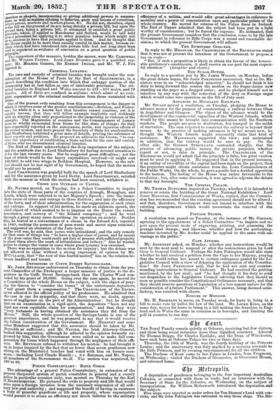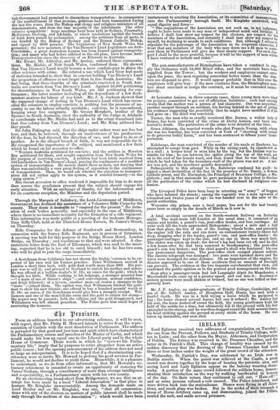C4r 31ir1rgingio.
A deputation of gentlemen belonging to the four important Australian Colonies, or connected with them in trade, had an interview with the Secretary of State for the Colonies, on Wednesday, on the subject of transportation. Sir William Molesworth introduced the deputation and the subject. Five ships were reported as under orders for Van Diemen's Land with con- victo, and Sir John Pakington WES entreated to stop those ships. The Bri-
tish Government had promised to discontinue transportation : in consequence of the nonfulfilment of that promise, petitions had been transmitted during the last five years, from the Bishop and clergy and religious ministers of all denominations, and from the vast majority of the inhabitants. The other colonies sympathize : large meetings have been held in Sydney, Paramatta, Melbourne, Geelong, and Adelaide, at which resolutions against the breach of faith have passed by acclamation : among the petitions from all parts, is one headed by the Bishop of Sydney and the Boman Catholic Bishop, and signed by 8000 persons. The Legislature of New South Wales has protested ; the new members of the Van Diemen's Land Legislature are Anti- Convictists ; a great Australian League has been formed against transporta- tion; and many who had before adhered to the old plan, have become Anti- Transportatiomsts since the discovery of an Eldorado in Australia.
Mr. Ewart, Mr. Adderley, and Mr. Anstey, enforced these representa- tions. Mr. Michie, of New South Wales, confirmed them. He showed that Van Diemen's Land would become a mere conduit-pipe to sluice the other colonies with crime. He refuted a use which Lord Grey had made of statistics intended to show that in convict-holding Van Diemen's Land the proportion of offences is not larger than in free South Australia; the fact being, that three-fourths of the criminals convicted in South Aus- tralia are convicts from Van Diemen's Land. Against 35,000 petitioning for discontinuance in New South Wales are 525 petitioning for con- tinuance; the latter number including all the dependents of a few flock. masters anxious for labour of any kind. Mr, J. A. Jackson showed that the supposed change of feeling in Van Diemen's Land which has recon- ciled the colonists to employ convicts is nothing but the pressure of ne- cessity to use the labour actually available ; convicts, be it remembered, keeping away free emigrants. Mr. George Morphett, brother of the Speaker in South Austha.lia, cited the authority of the Judge at Adelaide to corroborate what Mr. Mie,hie had said as to the crime transfused into that free colony from Van Diemen's Land ; and Mr. King adduced fur- ther proofs. Sir John Pakington said, that the ships under orders were not five but four, and that, he believed, through an inadvertence of his predecessor. Of the four, he had diverted the direction of one, and hoped to do so of another. is to the alleged breach of faith, he was not responsible for it. He recognized the importance of the subject., and mentioned a few facts which he found on his accession to office.
"Western Australia petitioned for convicts ; and the settlers in Moreton Bay petitioned for them, and sought separation from New South Wales for the purpose of receiving convicts. A petition had been lately received from 144 landholders in Van Diemen's Land, praying the continuance of a modified system of transportation. He merely stated these as facts, not denying that there was undoubtedly a very great feeling of opposition to the continuance of transportation. Then, he would ask whether the objection to transport- ation did not rather apply to the system, as it existed formerly—to the gang system ?' " His recent accession to office rendered it impossible for him to do more than assure the gentlemen present that the subject should engage his early attention. With an exchange of thanks, for the information and for its courteous reception, the Minister and the deputation parted.
Through the Marquis of Salisbury, the Lord-Lieutenant of Middlesex, Government has declined the assistance of a Volunteer Rifle Corps for the county. They deem it desirable to "suspend for the present" the form- ation of such bodies generally, and especially in the case of Middlesex, where there is no immediate necessity for the formation of a rifle regiment. This information was made public at a meeting of the inchoate Metropo- litan Rifle Club, hold at the Thatched House Tavern, St. James's Street, on Thursday.
Rifle Companies for the defence of Southwark and Bermondsey, in connexion with the Surrey Rifle Regiment, are in process of formation. A meeting was held for this purpose at the Bridge House Hotel, London Bridge, on Thursday ; and resolutions to that end were adopted. A cha- racteristic letter from the Earl of Ellesmere, which was read to the meet- ing, regretted that he is too old to enrol himself; but he has two sons, who will be glad to join the corps immediately.
A Scotchman from California has not shown the double 'cuteness to be ex- pected of his race and his Yankee practice. Peter Williamson arrived in London a short time back, with gold-dust worth more than 500/. His pur- pose was to sell it, and proceed to Scotland to enrich his mother and sisters. He was offered at a bullion-dealer's 3/. 12s. an ounce for the gold ; which he thought too little. While walking to his lodgings, a stranger accosted him —" a math of one of Green's ships "—and conversation, mutual confidence, and drink followed ; at a tavern, another man—of course a stranger to the "mats "—joined them. The upshot was that Williamson fetched the gold- dust to show his new friends; one offereceto buy a hundred pounds' worth at 31. 18s. an ounce, if the Scotchman would give him a stamped receipt. Wil- liamson and one of the men left the room and the gold to obtain the stamp— the sequel may be guessed ; both the villains and the gold disappeared, and Williamson was left almost penniless. The Police gave him small hopes of recovering the treasure.



























 Previous page
Previous page